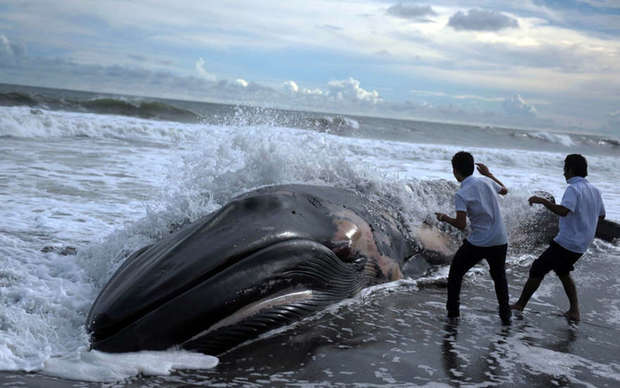TheQuestion creator about ''groups of death'': ''The recruitment of terrorists in England is arranged in a similar way''
The administration of the social network Vkontakte has started to block users who used the hashtag #синийкит associated with communities, allegedly calling members to commit suicide. A few days earlier, the project TheQuestion began to redirect their visitors who asked about ''blue whale'' (translation from Russian of ''синийкит'') to the page with phone numbers of psychologists — this was a response to an unprecedented surge of inquiries about ''groups of death'' on their resource. Realnoe Vremya talked to the creator of the project TheQuestion Tonya Samsonova, who spoke about why her team made this decision and who raised this wave of queries about ''blue whales''.
How hashtags replaced real recruiters
Who stands behind the ''group of death'' and what purpose do they pursue?
I think that in this discussion one should not be interested in my personal opinion. We know that, for example, the recruitment of terrorists, which takes place in England, is arranged in a similar way: the recruiters of ISIS (an organization banned in Russia — editor's note) find teenagers in the social networks worldwide, and teenagers are a group of people on whom these messages work very well. They find and target children specifically from disadvantaged areas or children who have had problems in their family or personal life. Such teenagers become an easy prey to various kinds of movements, including terrorist ones. You can easily observe it how in Russia the same conditional group of teenagers was an easy prey for those ultra-right-wing political movements. In adolescence, the group membership is important, this characteristic of age can be used for good, as well as for harm. That is why there are ''boy scouts'', the movement Nashi, etc. We understand that this is an age when people are very prone to collective action.

''In adolescence, group membership is important, this characteristic of age can be used for good, as well as for harm. That is why there are ''boy scouts'', the movement Nashi, etc'' Photo: lenta.ru
In the UK, where you are living, is there the trend with the ''group of death''?
Right now there is no such trend in the UK, but we know that there are different periods and different waves of such activity. In different periods the sectarian groups (anonymous or not anonymous) could recruit into their ranks. In the 20th century, it was harder to do because it required physical contact with a person, so the ability to recruit was lower. If earlier the sects needed people and evangelists who spread the information, now this function is performed by hashtags.
Who have raised the wave?
After the investigation, how often is TheQuestion asked about the ''groups of death''? Can you explain the recent surge of user activity in this direction?
I'll try to explain how these processes occur and what we see. This phenomenon on the Internet — the phenomenon of virality, or the phenomenon of surge in interest, can be well explained on example of video content. For example, you are media, and you post a video on YouTube, such story happened with video about the Middle East, which was published by Vice, when the war in Syria began. In this video, they told about the balance of power in the region — who is friends with whom, who is fighting against whom and so on.
After publishing, this video is watched, for example, by 1.5 million people, which is good enough. As a result, since it was a few years ago, every time there is a new wave of interest in the topic of ISIS or military conflicts, we see a surge of interest in this video. Someone of the users finds this video to understand who re-published it, for example, on Twitter.
As a result, the audience, which has not yet been covered, again get the opportunity to watch this video. Thus, the viral content that is not tied to time, which never expires, can be popular for a long period of time. If we look at the charts of number of watches, superimposed on the time axis, we see that, for example, five days — a splash — everybody watch, then fade, then six months, and again a splash (someone has shared or started to watch), and again the wave has reached a certain peak, and then again slept, and here we are again waiting for the next wave because no wave does not reach 100% of audience. The same is with your question: 10% of Russian teenagers know about ''blue whales'', but not 100%, and if one of the remaining 90% of children see it, a wave will rise up again.

''Since these children could not find information, but search engines could not give a relevant result, then they showed TheQuestion, which was at the top and that had more and more comments and responses from people who explained what ''blue whales'' is.'' Photo: novayagazeta-ug.ru
Tell us more details about the initiators of these waves.
Let's say we are trying to find the villain who on February 4 began to tell about ''blue whales'' to everyone again. It was not enough for him what was in January, and he, for example, wanted to do it again. I think there is no specific person behind this new surge — it's not some group of scary men in black suits who deliberately organise these waves. It was quite a few people at random. It's just the law of diffusion of information.
When we saw the 4 Feb a growth of search traffic, the following thing happened: people who have heard something about ''blue whales'' began to look for information on this topic on the Internet: a normal reaction, if you see something interesting — go to Google. They are searching online and can't find anything because this is not written in the media. One person of 200.000 users registered on TheQuestion was enough to ask this question and another person who found this question and answered it. Since these children could not find information, but search engines could not give a relevant result, then they showed TheQuestion, which was at the top and that had more and more comments and responses from people who explained what ''blue whales'' is.
And you decided to take some actions?
At the moment when we noticed it (this is not the first story with bursts and with what search engines at the request where there is no publicly available information redirect all to us), we called psychologists, as well as experts, who collaborate with TheQuestion. We asked them to answer these questions and tried to explain what's going on to everyone.
The wave did not subside, it was rising and reached a peak on 9 Feb. At this moment there appeared one of the good ideas suggested by Bulat Karimov. The thing is that the child search traffic that came to us we could see upon specific request (by that time, we could see hundreds of thousands of people from different cities of Russia who were looking for the information), and we could ''catch'' these children. We got in touch with psychologists, agreed with EMERCOM that we would supply the phones of the situation centre, to enable children to contact EMERCOM immediately and call the helpline. But we understand that this is not enough because children have different behaviour — someone calls, and someone doesn't. After that, the decision was made to redirect users to the special page with the text that we wrote together with psychologists. Then a great thing happened: a lot of psychologists who work with children and teachers who asked us to leave their personal phone numbers to communicate called us.

''I can only assume that this situation has received more popularity and urgency due to the fact that the media can't write about suicide the way they wrote about it before. It is right or wrong — I don't know.'' Photo: gdb.rferl.org
''For the first time we faced the fact that the question concerns life and death''
In your opinion, isn't this topic being widely discussed only to tighten the screws harder?
You know, for every phenomenon we'd like to find a toothy villain who organised all of this. I'd like to find a person who invented it, but it is necessary to understand the nature of phenomena. I can tell you that such waves, for example, on TheQuestion, they happen every two weeks, and they don't always relate to teenagers (actually, for the first time we observe that is it the question of life and death). The nature of the ''blue whale'' is no different from the nature of viral videos or memes.
We do not know the impact of this situation. I can only assume that in a situation when you forbid to write about suicide and information cannot be found, people begin to discuss it in some groups, instead of discussing it with qualified people. I can only assume that this situation has received more popularity and urgency due to the fact that the media can't write about suicide the way they wrote about it before. It is right or wrong — I don't know.